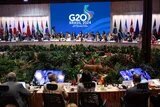C20-Climate financing And the G20
It has been calculated that climate finance requires between 2 to 4 trillion dollars in the next seven years. The current financing gap is between 780 to 920 billion dollars annually.
Besides the Green Climate Fund (GCF), created in 2010 with a replenishment commitment of 100 billion annually, three new funds were created in 2022 to attract or allocate public and private capital: the IMF’s Resilience and Sustainability Facility, the Loss and Damage Fund, and Bridgetown Initiative’s Global Mitigation and Trust Fund. One innovative aspect of these funds is to be used as a mechanism to reallocate IMF issued Special Drawing Rights. Of the 650 billion issued in 2021, about 44 billion has been promised to be reallocated to the fund.
Since 2009, in the aftermath of the financial crisis and the ensuing recession, the G20 have issued statements on the need for climate finance. In tandem with the United Nations Framework Convention on Climate Change (UNFCCC,) it has created and promoted the GCF, despite not fulfilling the original pledge of 100 billion dollars per year contribution. But all the way up to 2020, the G20 statements on the matter is either about leveraging or attracting private capital for voluntary contributions.
Therefore, as has being reiterated by the civil society around the world, neither mechanism has worked so far and the funds allocated are far from sufficient, and frequently are not timely disbursed. As in many cases for developing sound policies, civil society organizations at the forefront of the issues, and based on evidence from the territories have, through the C20 engagement mechanism recommended actions to be undertaken by the G20 governments.
The C20, for instance, has proposed the creation of a climate finance roadmap, besides shifting investment from dirty to clean energy; including the adoption of global financial transactions tax for climate financing. Besides, it demands the fulfillment of all commitments already made; welcomes the efforts by the GCF and the recent Loss and Damage fund creation; and the update of Nationally Determinant Contributions. Furthermore, it insists on Common But Differentiated Responsibilities (CBDR) as a fundamental concept for financing mitigation and, more importantly, adaptation to the changes caused by severe climate events.
The G20 in Brazil is an important chance to take realistic stock of the current state of poli-crisis. The C20 will continue to advocate for the implementation of the commitments made at multilateral levels, reminding governments the need to establish mechanisms to stop destruction and to adequately finance environmental reconstruction.
The current Brazilian government does recognize the importance of the 2030 Agenda for Sustainable Development, the UN Framework Convention on Climate Change and the Paris Agreement as fundamental pillars for a common future of all nations, although the CSO in Brazil struggle to enact policies that would revert the process of natural destruction based on agro monoculture and mining, while increasing investment in climate mitigation and adaptation.
